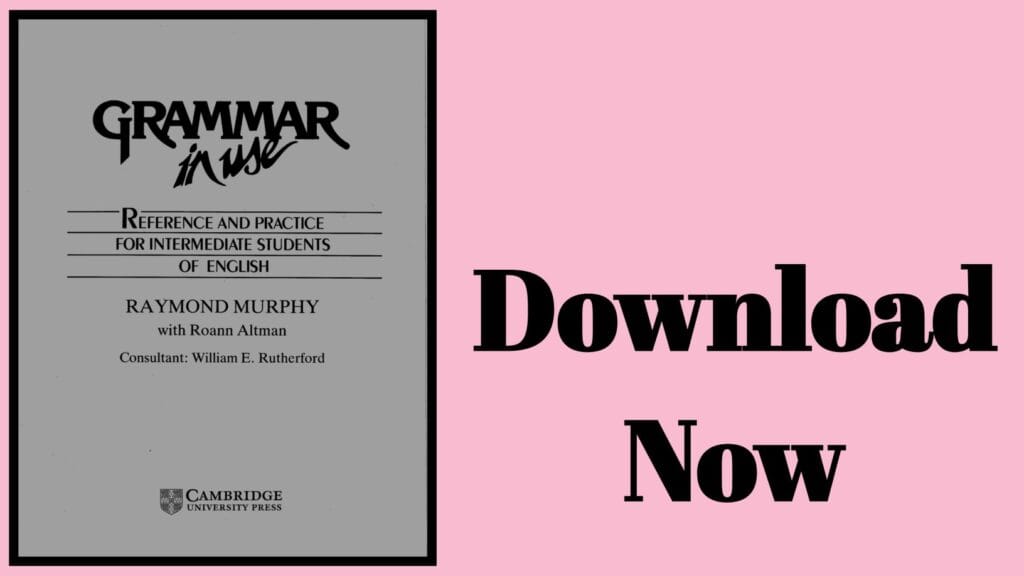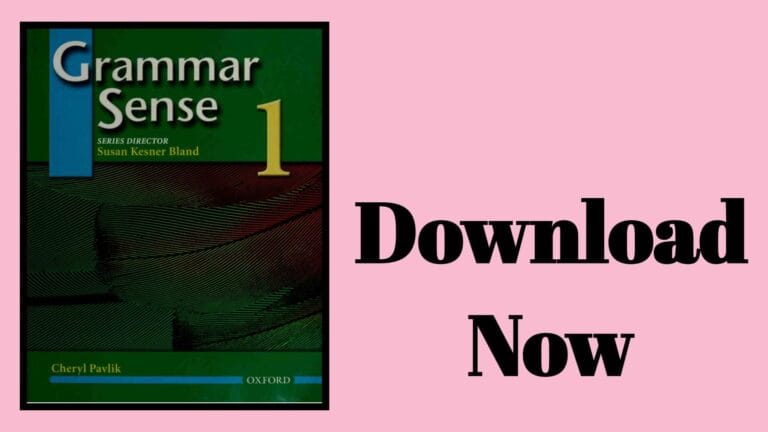
Grammar in Use Reference and Practice
“Grammar in Use Reference and Practice” is a grammar book written by the grammar expert Raymond Murphy and is designed for the intermediate level learners of English grammar. The book covers all the important grammar rules you need to learn when you’re at the intermediate level of English grammar.
The name of the book suggests that it is a reference book that you can use as a reference meaning you can seek for a piece of information related to grammar. Similarly, the book is a practice book which means that you need to go through the contents of the book and actively engage in the exercises in order to ingrain into your mind what you’ve learned from the book.
Why Read This Book?
Whether you should read a book or not depends on its author, its contents and its lessons. The book written by an authoritative subject expert which includes all the essential contents and is arranged in a beautiful manner can give you all you need: good experience and sufficient information.
Here’s why you should go with this book:
All Topics of a Level: The book is an all inclusive; that is, the author added all the possible grammar topics keeping in mind a particular level which B1 and B2 or intermediate grammar level which you upgrade to when you’re done with the basics or A1 and A2 levels of grammar.
Applied Grammars: The book features all the grammar rules of intermediate level that are currently in use; that is, all you learn from the book is not unnecessary or irrelevant, but rather, you can immediately put into practice what you’ve learned from the book.
Authentic Learning: The book is written by the renowned author, Raymond Murphy which makes it one of the best books on English grammar which you can ever read. The authenticity of the content is based on the authenticity of its compiler, and the compiler is the grammar expert Raymond Murphy.
What are Tenses in English?
Tenses in English grammar refer to show us the time when an action took place or when a state of being is true. In English grammar, we have three types of tenses: present, past and future. All the three tenses have four subcategories which make a total of 12 tenses in English.
Here are the 12 tenses in English:
- Present indefinite
- Present continuous
- Present perfect
- Present perfect continuous
- Past indefinite
- Past continuous
- Past perfect
- Past perfect continuous
- Future indefinite
- Future continuous
- Future perfect
- Future perfect continuous
What are Modal Verbs in English?
Modal verbs in English express modality or some certain characteristics such as possibility, ability, request, obligation, prohibition, etc. The modal verbs are a special type of verbs in English. There are two main types of modal verbs in English: principal and semi modal verbs.
Here are the principal modal verbs in English:
- Can
- Could
- Will
- Would
- Shall
- Should
- May
- Might
- Must
Here are the semi modal verbs in English:
- Need
- Dare
- About to
- Likely to
- Supposed to
- Able to
- Going to
- Have/has to
- ought to
What are Conditional Sentences in English?
The conditional sentences in English show that one action is dependent on the other. If something happens, then the other thing will happen. There are two types of conditional sentences: real conditional sentences and unreal conditional sentences.
Here are the types of conditional sentenses:
- Zero conditional sentence: If you boil it, it boils.
- First conditional sentence: If you come, I will come.
- Second conditional sentence: If you came, I would come.
- Third conditional sentence: If you had come, I would have come.
Table of Content
Tenses
Present continuous (I am doing)
Simple present (I do)
Present continuous (I am doing) or simple present (I do)?
Present tenses (I am doing / I do) with a future meaning
Going to (I am going to do)
Will (1)
Will (2)
Will or going to?
When and if sentences (When I do… / If I do…)
Will be doing and will have done
Simple past (I did)
Past continuous (I was doing)
Present perfect (I have done)
Present perfect (I have done) (2)
Present perfect (I have done) (3)
Present perfect continuous (I have been doing)
Present perfect continuous (I have been doing) or present perfect simple (I have done)?
For, since, and ago
Present perfect with how long; simple past with when
Simple past (I did) or present perfect (I have done)?
Past perfect (I had done)
Past perfect continuous (I had been doing)
Have and have got
Used to (I used to do)
Modal Verbs
Can, could, and be able to
Could do and could have done
May (might) and can (could)
Must (have) (and can’t have)
Should
Subjunctive (I suggest you do)
Conditionals
If sentences (present/future)
If and wish sentences (present)
If and wish sentences (past)
Would
In case
Unless, as long as, and provided/providing (that)
Passive
Passive (1) (be done / have been done)
Passive (2) (present and past tenses)
Passive (3)
It is said that… / He is said to…, etc., and supposed to
Have something done
Reported Speech
Reported speech (1)
Reported speech (2)
Questions
Questions (1)
Questions (2) (Do you know where…? / He asked me where…)
Auxiliary verbs in short answers / short questions, etc.
So / Neither am I, etc.
Tag questions (You are? doesn’t he?, etc.)
-ing and the Infinitive
Verb + -ing
Verb + infinitive
Verb + -ing or to…?
Infinitive or -ing? (1) like, would like, etc.
Infinitive or -ing? (2) – begin, start, continue, remember, try
Preposition + -ing
Verb + preposition + -ing
Expressions + -ing
Be/get used to something (I’m used to…)
Infinitive of purpose – “I went out to mail a letter.”
So that
Prefer and would rather
Had better do something
It’s time someone did something
See someone do and see someone doing
-ing clauses – “Feeling tired, I went to bed early.”
Articles
Uncountable nouns (gold, music, advice, etc.)
Countable nouns with a/an and some
A/an and the
The (1)
The (2)
Plural and uncountable nouns with and without (the flowers / the flowers)
School / the school, prison / the prison, etc.
Geographical names with and without the
Names of places, buildings, etc. with and without the
Singular or plural? (1)
Singular or plural? (2)
’s (apostrophe s) and of
Possessive pronouns (my/your/own), etc., by myself
All (of), most (of), no/none of, etc.
Reflexive pronouns (myself, yourself, etc.)
Both, either, neither of
Some/any
Some/any + -body/-thing/-where
No/none/any
All, every, and whole
Relative Clauses
Relative clauses (1) – clauses with who/that/which
Relative clauses (2) – clauses with or without who/that
Relative clauses (3) – whose, whom, and where
Relative clauses (4) – “extra information” clauses (1)
Relative clauses (5) – “extra information” clauses (2)
-ing and -ed clauses (“the woman talking to Tom,” “the man injured in the accident”)
Adjectives and Adverbs
Adjectives ending in -ing and -ed (boring/bored, etc.)
Adjectives: Word order (“a nice new house”)
After verbs (“Do you feel tired?”)
Adjectives and adverbs (1) (quick/quickly)
Adjectives and adverbs (2) (good/well, fast/hard/late, hardly)
So and such
Enough and too
The infinitive after adjectives
Comparison (1) – cheaper, more expensive, etc.
Comparison (2)
Comparison (3) – as…as / than
Superlatives – the longest, the most enjoyable, etc.
Word Order
Word order (1) – verb + object; place and time
Word order (2) – adverbs with the verb
Others
Still and yet
Anymore / any longer / no longer
Although/though/even though
In spite of / despite
Even
As (time) – “I watched her as she opened the letter.”
As (reason) – “As I was feeling tired, I went to bed early.”
Like and as
As if
Prepositions
At/on/in (time)
For, during, and while
By and until
By the time…
In/at/on (position) (1)
In/at/on (position) (2)
To, been to, into
By car/in my car
Noun + preposition (“reason for,” “cause of,” etc.)
Preposition + noun (“by mistake,” “on television,” etc.)
Adjective + preposition (1)
Adjective + preposition (2)
Verb + preposition (1)
Verb + preposition (2)
Verb + preposition (3)
Verb + object + preposition (1)
Verb + object + preposition (2)
Phrasal verbs (get up, break down, fill in, etc.)
Appendices
List of present and past tenses
Regular and irregular verbs
Spelling
Short forms (I’m/didn’t, etc.)
Conclusion: Grammar in Use Reference and Practice
To summarize what has been said so far, Learning English grammar for ESL learners is crucial for becoming fluent in English. English grammar lets you express your ideas by constructing grammatical sentences. As a learner of grammar, you need to learn the most useful and common grammar topics such as tenses, active voice and passive voice, parts of speech, modal verbs, helping verbs, direct and indirect speeches, articles, phrase and clause structures.
When you decide to learn English grammar, you need to study grammar both online and offline. That is to say that you need to take help from both virtual and physical resources. To help you learn English grammar, we present to you this book.


